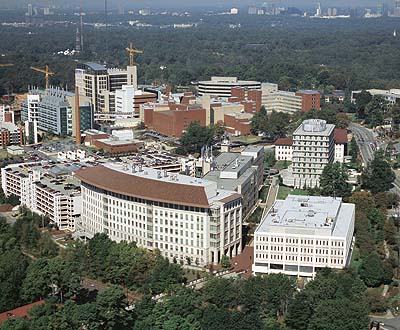The wellness research center boom


While manufacturing tends to push development away from urban centers, health seems to concentrate them in the center.
Universities have replaced banks and corporate offices as the driving forces behind urban development and health is one of their primary products.
When I moved to Atlanta, nearly 30 years ago now, I was 5 miles east of the city's major employment center, the banks and headquarter towers of downtown. Now I'm just 2 miles away, and the center is to my north, around Emory Hospital and the CDC (shown here).
It's a national trend. And it's growing again, as a new round of grants around wellness and prevention filter down, often into new locations.
In Atlanta some of that money is going to the old downtown, now dominated by Georgia State University. They just got a $6.7 million grant to study health disparities. It's similar to a $5.6 million grant given UT-San Antonio, studying cancer in Latinos.
In Dallas, Texas Gov. Rick Perry was at the UT Dallas Center for Vital Longevity, where talk was of a "halo effect" of surrounding businesses. Gov. Beverly Perdue of North Carolina was saying similar things in Kannapolis, NC, dedicating a new community college built around health careers.
The University of Pennsylvania is breaking ground, adding to its $370 million center studying health rhythms. The University of Memphis was celebrating $4.9 million in federal grants.
It's not just big cities, but university towns which benefit. Penn State is building a $48.1 million building dedicated to behavioral health. Michigan State just opened a new medical school building.
It's not all government money. The University of South Carolina is building an "innovation center" in pharmacy with $30 million from an alumnus. The Jaeb Center in Tampa just got $26 million from the estate of the late Leona Helmsley for diabetes research. I have previously written about the growing West Wireless Health Institute in San Diego, also funded privately.
Health research is a continuing money hunt, and politicians get graded on the outcome. The University of Hawaii is finally breaking ground on its $100 million cancer research facility, with many saying the islands' future lies in becoming a "regional center" between Japan and the U.S. in the area.
The point is that health technology and health research have long been among the most dynamic forces shaping U.S. cities, even if we haven't noticed it. That's getting a bump from health reform.
Even though the aim of the bill was to bend the cost curve downward there is money to be made and spent in figuring out how.